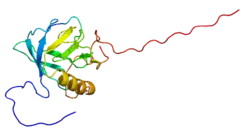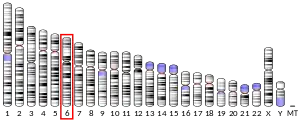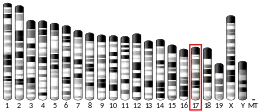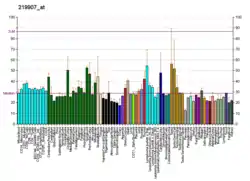FRS3
Fibroblast growth factor receptor substrate 3 is a protein that in humans is encoded by the FRS3 gene.[5][6][7]
| FRS3 | |||||||||||||||||||||||||||||||||||||||||||||||||||
|---|---|---|---|---|---|---|---|---|---|---|---|---|---|---|---|---|---|---|---|---|---|---|---|---|---|---|---|---|---|---|---|---|---|---|---|---|---|---|---|---|---|---|---|---|---|---|---|---|---|---|---|
 | |||||||||||||||||||||||||||||||||||||||||||||||||||
| |||||||||||||||||||||||||||||||||||||||||||||||||||
| Identifiers | |||||||||||||||||||||||||||||||||||||||||||||||||||
| Aliases | FRS3, FRS2-beta, FRS2B, FRS2beta, SNT-2, SNT2, fibroblast growth factor receptor substrate 3 | ||||||||||||||||||||||||||||||||||||||||||||||||||
| External IDs | OMIM: 607744 MGI: 2135965 HomoloGene: 4845 GeneCards: FRS3 | ||||||||||||||||||||||||||||||||||||||||||||||||||
| |||||||||||||||||||||||||||||||||||||||||||||||||||
| |||||||||||||||||||||||||||||||||||||||||||||||||||
| |||||||||||||||||||||||||||||||||||||||||||||||||||
| |||||||||||||||||||||||||||||||||||||||||||||||||||
| |||||||||||||||||||||||||||||||||||||||||||||||||||
| Wikidata | |||||||||||||||||||||||||||||||||||||||||||||||||||
| |||||||||||||||||||||||||||||||||||||||||||||||||||
The protein encoded by this gene is a substrate for the fibroblast growth factor receptor. It is found in peripheral plasma membrane and functions in linking FGF receptor stimulation to activators of Ras.[7]
References
- GRCh38: Ensembl release 89: ENSG00000137218 - Ensembl, May 2017
- GRCm38: Ensembl release 89: ENSMUSG00000023266 - Ensembl, May 2017
- "Human PubMed Reference:". National Center for Biotechnology Information, U.S. National Library of Medicine.
- "Mouse PubMed Reference:". National Center for Biotechnology Information, U.S. National Library of Medicine.
- Wang JK, Xu H, Li HC, Goldfarb M (Oct 1996). "Broadly expressed SNT-like proteins link FGF receptor stimulation to activators of Ras". Oncogene. 13 (4): 721–9. PMID 8761293.
- Xu H, Lee KW, Goldfarb M (Aug 1998). "Novel recognition motif on fibroblast growth factor receptor mediates direct association and activation of SNT adapter proteins". J Biol Chem. 273 (29): 17987–90. doi:10.1074/jbc.273.29.17987. PMID 9660748.
- "Entrez Gene: FRS3 fibroblast growth factor receptor substrate 3".
Further reading
- Lim YP, Low BC, Lim J, et al. (1999). "Association of atypical protein kinase C isotypes with the docker protein FRS2 in fibroblast growth factor signaling". J. Biol. Chem. 274 (27): 19025–34. doi:10.1074/jbc.274.27.19025. PMID 10383403.
- Ong SH, Guy GR, Hadari YR, et al. (2000). "FRS2 proteins recruit intracellular signaling pathways by binding to diverse targets on fibroblast growth factor and nerve growth factor receptors". Mol. Cell. Biol. 20 (3): 979–89. doi:10.1128/MCB.20.3.979-989.2000. PMC 85215. PMID 10629055.
- Yamada M, Suzuki K, Mizutani M, et al. (2001). "Analysis of tyrosine phosphorylation-dependent protein-protein interactions in TrkB-mediated intracellular signaling using modified yeast two-hybrid system". J. Biochem. 130 (1): 157–65. doi:10.1093/oxfordjournals.jbchem.a002955. PMID 11432792.
- Yan KS, Kuti M, Yan S, et al. (2002). "FRS2 PTB domain conformation regulates interactions with divergent neurotrophic receptors". J. Biol. Chem. 277 (19): 17088–94. doi:10.1074/jbc.M107963200. PMID 11877385.
- Strausberg RL, Feingold EA, Grouse LH, et al. (2003). "Generation and initial analysis of more than 15,000 full-length human and mouse cDNA sequences". Proc. Natl. Acad. Sci. U.S.A. 99 (26): 16899–903. Bibcode:2002PNAS...9916899M. doi:10.1073/pnas.242603899. PMC 139241. PMID 12477932.
- Ranzi V, Meakin SO, Miranda C, et al. (2003). "The signaling adapters fibroblast growth factor receptor substrate 2 and 3 are activated by the thyroid TRK oncoproteins". Endocrinology. 144 (3): 922–8. doi:10.1210/en.2002-221002. PMID 12586769.
- Mungall AJ, Palmer SA, Sims SK, et al. (2003). "The DNA sequence and analysis of human chromosome 6". Nature. 425 (6960): 805–11. Bibcode:2003Natur.425..805M. doi:10.1038/nature02055. PMID 14574404.
- Gotoh N, Laks S, Nakashima M, et al. (2004). "FRS2 family docking proteins with overlapping roles in activation of MAP kinase have distinct spatial-temporal patterns of expression of their transcripts". FEBS Lett. 564 (1–2): 14–8. doi:10.1016/S0014-5793(04)00287-X. PMID 15094036. S2CID 35571861.
- Hassel S, Eichner A, Yakymovych M, et al. (2004). "Proteins associated with type II bone morphogenetic protein receptor (BMPR-II) and identified by two-dimensional gel electrophoresis and mass spectrometry". Proteomics. 4 (5): 1346–58. doi:10.1002/pmic.200300770. PMID 15188402. S2CID 6773754.
- Huang L, Gotoh N, Zhang S, et al. (2004). "SNT-2 interacts with ERK2 and negatively regulates ERK2 signaling in response to EGF stimulation". Biochem. Biophys. Res. Commun. 324 (3): 1011–7. doi:10.1016/j.bbrc.2004.09.152. PMID 15485655.
- Gerhard DS, Wagner L, Feingold EA, et al. (2004). "The status, quality, and expansion of the NIH full-length cDNA project: the Mammalian Gene Collection (MGC)". Genome Res. 14 (10B): 2121–7. doi:10.1101/gr.2596504. PMC 528928. PMID 15489334.
- Harada A, Katoh H, Negishi M (2005). "Direct interaction of Rnd1 with FRS2 beta regulates Rnd1-induced down-regulation of RhoA activity and is involved in fibroblast growth factor-induced neurite outgrowth in PC12 cells". J. Biol. Chem. 280 (18): 18418–24. doi:10.1074/jbc.M411356200. PMID 15738000.
- Huang L, Watanabe M, Chikamori M, et al. (2006). "Unique role of SNT-2/FRS2beta/FRS3 docking/adaptor protein for negative regulation in EGF receptor tyrosine kinase signaling pathways". Oncogene. 25 (49): 6457–66. doi:10.1038/sj.onc.1209656. PMID 16702953.
This article is issued from Wikipedia. The text is licensed under Creative Commons - Attribution - Sharealike. Additional terms may apply for the media files.




